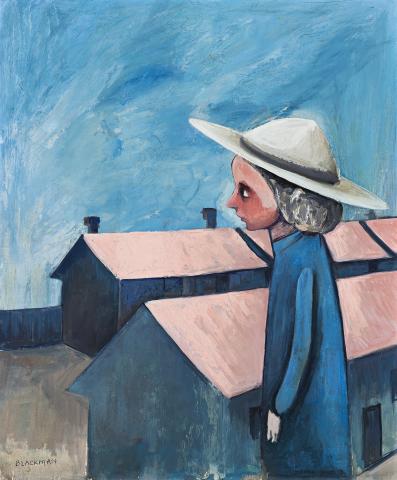SCHOOLGIRL AND BUILDINGS, c.1952 – 53
CHARLES BLACKMAN
oil on composition board
75.0 x 62.0 cm
signed lower left: BLACKMAN
Private collection, acquired directly from the artist
Thence by descent
Private collection, Sydney
Deutscher~Menzies, Sydney, 7 December 2005, lot 19
Private collection, Sydney
Lawson~Menzies, Sydney, 26 March 2006, lot 115
Private collection, Sydney
The ‘Schoolgirl’ paintings form Charles Blackman’s first sustained series. Dressed in trademark wide hats, the girls inhabit a netherworld of vaguely familiar architecture, harsh light and menacing shadow. In the early 1950s, Blackman and his wife Barbara were living in a converted stable in Hawthorn where ‘we were surrounded by thousands and thousands of schools and schoolgirls.’1 Blackman covered the walls with his paintings and drawings, adding to them every day in a frenzy of work. In September 1952, a university friend of Barbara’s (Betty Shanks) was murdered, a crime that remains unsolved to this day. The effect of this distressing event on Barbara was no doubt compounded by her encroaching blindness. In response, Blackman had already started routinely reading to his wife and this activity sharply increased the significance of the written word for them both. ‘It was at this time too that I started to read Shaw Neilson – I didn’t actually start painting schoolgirls because Neilson wrote poems about them, but I found his poems when I was about halfway through this period and I thought them very beautiful … he had very bad eyesight and he used to write about things in a certain kind of way – he used to write about these things using these emotional powerful throbbing colours; they seemed to come out of the poems, you see, terrific things!’2 Another source was the remembered tale of the brutal murder of 12 year-old Alma Tirtschke near the city’s Eastern Markets in 1921. All these influences ‘sowed the seed for theme of innocent schoolgirls and lurking men.’3 Painted in acerbic pinks and blues, the girls walk through deserted alleys, play in schoolyards with their eyes averted or, in the case of Schoolgirl and Buildings, gaze longingly over anonymous buildings, ‘their eyes laced with black laces.’4
The initial exhibition of the ‘Schoolgirl series’ opened at the Peter Bray Gallery in May 1953 and an excerpt from a Shaw Neilson poem was printed in the catalogue including the couplet: Schoolgirls hastening through the light / Touch the unknowable divine. The local critic Allan McCulloch, who had previously highlighted the psychological element in Blackman’s paintings, now wrote excitedly that ‘(t)he artist has projected his personality, with all its hopes and frustrations, into the extremely difficult subject of the schoolgirl. … (The paintings) speak rather aggressively, perhaps, but with undeniable power and artistry. … In the hands of the merely competent painter such a subject would be ludicrous. In Blackman’s hands Neilson’s schoolgirl becomes a creature of endless aesthetic possibilities … at once exciting and extremely stimulating.’5 Later that year, when Mirka Mora launched her Studio gallery, she mounted another ‘Schoolgirls’ exhibition as the opening show. Four years later, the ‘Alice in Wonderland’ paintings established Charles Blackman as one of Australia’s most important young artists. This latter series was praised for its outsized figure proportions, mysterious juxtapositions and unexpected colour associations, traits which already feature significantly in Schoolgirl and Buildings.
1. Shapcott, T., Focus on Charles Blackman, University of Queensland Press, Brisbane, 1967, p. 16
2. Ibid., p. 17
3. Moore, F. St. J., Charles Blackman: Schoolgirls and Angels, National Gallery of Victoria, Melbourne, 1993, p. 17
4. Blackman, C., 1966, quoted in: Moore, F. St, J., ibid., p. 44
5. McCulloch, A., ‘Quantity and Quality’, Herald, Melbourne, 12 May 1953, p. 10
ANDREW GAYNOR
